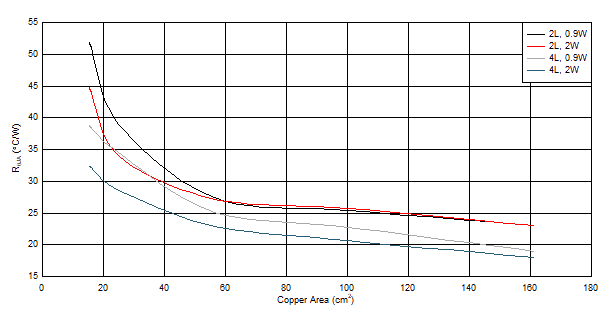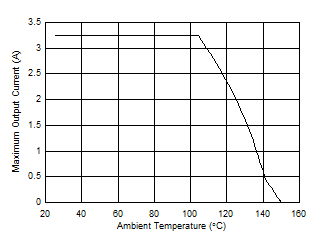SNVSCO0 January 2024 LM63635C-Q1
PRODUCTION DATA
- 1
- 1 Features
- 2 Applications
- 3 Description
- 4 Device Comparison Table
- 5 Pin Configuration and Functions
- 6 Specifications
- 7 Detailed Description
- 8 Application and Implementation
- 9 Device and Documentation Support
- 10Revision History
- 11Mechanical, Packaging, and Orderable Information
Package Options
Mechanical Data (Package|Pins)
- DRR|12
Thermal pad, mechanical data (Package|Pins)
- DRR|12
Orderable Information
8.2.2.8 Maximum Ambient Temperature
As with any power conversion device, the LM63635C-Q1 dissipates internal power while operating. The effect of this power dissipation is to raise the internal temperature of the converter above ambient. The internal die temperature (TJ) is a function of the ambient temperature, the power loss, and the effective thermal resistance, RθJA, of the device, and PCB combination. The maximum internal die temperature for the LM63635C-Q1 must be limited to 150°C. This limit establishes a limit on the maximum device power dissipation and, therefore, the load current. Equation 10 shows the relationships between the important parameters. Seeing that larger ambient temperatures (TA) and larger values of RθJA reduce the maximum available output current is easy. The converter efficiency can be estimated by using the curves provided in this data sheet. Note that these curves include the power loss in the inductor. If the desired operating conditions cannot be found in one of the curves, then interpolation can be used to estimate the efficiency. Alternatively, the EVM can be adjusted to match the desired application requirements and the efficiency can be measured directly. The correct value of RθJA is more difficult to estimate. As stated in the Semiconductor and IC Package Thermal Metrics application report, the value of RθJA given in the Section 6.4 table is not valid for design purposes and must not be used to estimate the thermal performance of the application. The values reported in that table were measured under a specific set of conditions that are rarely obtained in an actual application. The data given for RθJC(bott) and ΨJT can be useful when determining thermal performance. See the Semiconductor and IC Package Thermal Metrics application report for more information and the resources given at the end of this section.
where
- η = efficiency
The effective RθJA is a critical parameter and depends on many factors such as the following:
- Power dissipation
- Air temperature and flow
- PCB area
- Copper heat-sink area
- Number of thermal vias under the package
- Adjacent component placement
The WSON12 package uses a die attach paddle, or "thermal pad" (DAP), to provide a place to solder down to the PCB heat-sinking copper. This usage provides a good heat conduction path from the regulator junction to the heat sink and must be properly soldered to the PCB heat sink copper. Typical examples of RθJA versus copper board area can be found in Figure 8-3. The copper area given in the graph is for each layer. The top and bottom layers are 2oz copper each, while the inner layers are 1 oz. Figure 8-4 shows a typical curve of maximum output current versus ambient temperature. This data was taken with a device and PCB combination, giving an RθJA of approximately 22°C/W. Remember that the data given in these graphs are for illustration purposes only, and the actual performance in any given application depends on all of the previously mentioned factors.
 Figure 8-3 Typical
RθJA vs Copper Area for the WSON Package
Figure 8-3 Typical
RθJA vs Copper Area for the WSON Package Figure 8-4 Maximum
Output Current versus Ambient Temperature VIN = 12V, VOUT
= 5V, ƒSW = 400kHz, RθJA = 22°C/W
Figure 8-4 Maximum
Output Current versus Ambient Temperature VIN = 12V, VOUT
= 5V, ƒSW = 400kHz, RθJA = 22°C/WThe following resources can be used as a guide to excellent thermal PCB design and estimating RθJA for a given application environment:
- AN-2020 Thermal Design By Insight, Not Hindsight application report
- A Guide to Board Layout for Best Thermal Resistance for Exposed Pad Packages application report
- Semiconductor and IC Package Thermal Metrics application report
- Thermal Design Made Simple with LM43603 and LM43602 application report
- Using New Thermal Metrics application report